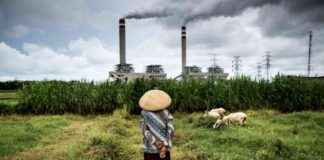As the flames engulfed a McDonald’s restaurant in Pasadena during the recent catastrophic California wildfires, the image resonated deeply with viewers across the nation. The burning symbol of the American Dream crumbling alongside the homes of the rich and famous served as a stark reminder of the inescapable impacts of climate change, even for the most privileged in society. The devastation caused by the fires, now fully contained, highlighted the urgent need for action to address the root causes of such disasters.
Climate Change and the Food System
Emily Armistead, Interim Executive Director at Madre Brava, emphasized the critical role of the food system, particularly meat and dairy production, in contributing to climate change. While global greenhouse gas emissions from food production account for approximately one-third of total emissions, this aspect is often overlooked in climate mitigation strategies. Armistead pointed out that with corporate leadership from industry giants like McDonald’s and political will, significant strides could be made in reducing the impact of the food system on both the climate and human health.
Livestock Emissions Problem
One of the key contributors to greenhouse gas emissions from the food system is the production and consumption of livestock. Studies based on IPCC data and other research suggest that the livestock sector alone may be responsible for up to 20% of all climate emissions. Surprisingly, major meat producers such as JBS and Tyson Foods have emissions footprints comparable to those of fossil fuel companies. Despite this significant impact, meat companies, including fast-food chains like McDonald’s, have not been as prominently associated with climate breakdown as oil and gas corporations.
The Shift Towards Sustainable Food
In recent years, there has been a gradual shift towards acknowledging the role of the food system in climate change. At the COP28 Dubai climate summit, 159 governments signed a declaration on sustainable food and agriculture, signaling a growing recognition of the need for change. Some companies, particularly in the retail sector, have also begun to pivot towards more sustainable practices. For example, several European supermarkets have committed to increasing the availability of plant-based proteins in their stores, reducing reliance on animal products.
Peak Meat and Consumer Trends
Experts suggest that we may be approaching a point of ‘peak meat’ where consumer preferences and dietary habits shift towards plant-based alternatives. Research conducted by Madre Brava indicates that a significant portion of consumers in countries like Germany, France, the UK, and the US are open to reducing their meat consumption. As plant-based options become more accessible and appealing, consumers are increasingly adopting flexitarian lifestyles. For instance, Burger King’s introduction of plant-based Whoppers in Europe at a lower price point has led to a surge in sales, demonstrating the potential for reducing meat consumption.
Transforming the Food System
Transforming the food system to mitigate its impact on the climate requires a concerted effort from both the private sector and governmental bodies. Governments play a crucial role in setting ambitious food strategies that prioritize sustainability and health metrics. By incorporating food-related goals into their Nationally Determined Contributions under the Paris Climate Agreement and net-zero plans, policymakers can drive systemic changes in how we produce and consume food. Just as the energy sector has made significant strides towards reducing emissions, it is imperative that the food industry follows suit to address its substantial climate impact.
In the aftermath of the devastating wildfires and amidst the ongoing climate crisis, the urgent need to address the food system’s contribution to climate change has never been more apparent. By fostering innovation, creating supportive market conditions, and implementing effective government policies, the food sector can play a pivotal role in reducing emissions and building a more sustainable future for generations to come. The time for action is now.














